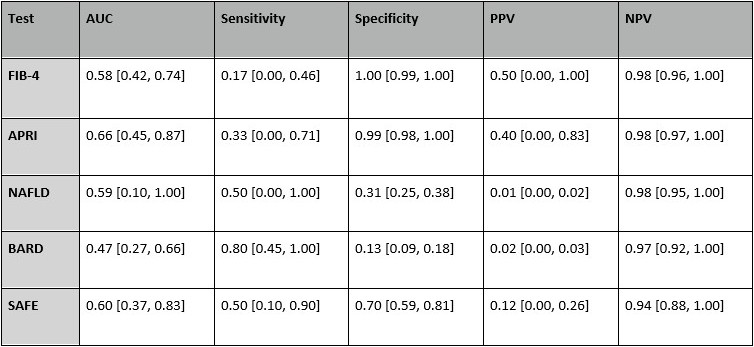Monday Poster Session
Category: Liver
P3808 - How Well Do MASLD and MASH Scores Predict Fibrosis in Bariatric Surgery Patients?
Monday, October 27, 2025
10:30 AM - 4:00 PM PDT
Location: Exhibit Hall

Bara Abujaber, MBBS (he/him/his)
MedStar Georgetown/Washington Hospital Center
Washington, DC
Presenting Author(s)
Bara Abujaber, MBBS1, Nadera Altork, MD2, Ahmed El Sabagh, MBChB, MSc3, Nour Abu Irhayem, MBBS4, Ahmad Abdulraheem, MD5, Salwan Al-Saad Alla, MD2, Ivanesa Pardo, MD6, Jennifer Tran, MD, MBA7
1MedStar Georgetown/Washington Hospital Center, Washington, DC; 2MedStar Washington Hospital Center, Washington, DC; 3MedStar Health, Washington, DC; 4MedStar Georgetown/ Washington Hospital Center, Washington, DC; 5MedStar Washington Hospital Center-Georgetown University, Washington, DC; 6MedStar Georgetown University Hospital, Washington, DC; 7Medstar Washington Hospital Center, Washington, DC
Introduction: Metabolic dysfunction-associated steatotic liver disease (MASLD) is prevalent, particularly among obese patients undergoing bariatric surgery. Several scoring systems have been developed to assess the risk of fibrosis in MASLD, including the FIB-4 index, NAFLD fibrosis score (NFS), BARD, SAFE, and APRI scores. This study aims to evaluate the diagnostic accuracy of these scoring systems in comparison to liver biopsy findings, which remain the gold standard.
Methods: We retrospectively reviewed charts from Jan 2010 to Nov 2023 at two tertiary centers. Adults (≥18 years) undergoing bariatric surgery with intraoperative liver biopsy showing ≥5% steatosis were included. Patients with prior revision surgery or liver disease were excluded. Of 311 eligible patients, data were analyzed using Wilcoxon rank sum and Fisher’s exact tests (p < 0.05). AUC was assessed via the DeLong method; sensitivity, specificity, PPV, and NPV were compared using McNemar and Moskowitz-Pepe methods. The primary outcome was diagnostic accuracy in detecting advanced fibrosis (F3–F4) by each score compared to liver biopsy. SAFE score was analyzed separately due to its broader fibrosis definition (F2–F4).
Results: Out of 311 patients, 6 had advanced fibrosis (F3–F4) on liver biopsy. Platelet count was significantly lower in the advanced fibrosis group (p = 0.023). Histologic features including steatosis, ballooning, and inflammation were more severe in these patients (p < 0.01 for all). Diagnostic performance varied across scores. FIB-4 and APRI had the highest specificity (1.00 and 0.99) but low sensitivity. BARD had the highest sensitivity (0.80) with the lowest specificity (0.13). SAFE showed intermediate sensitivity and specificity (0.50 and 0.70) but was excluded from direct comparisons. All scores showed high NPV and low PPV. A significant difference in specificity was observed between FIB-4 and BARD (p < 0.001).
Discussion: Non-invasive fibrosis scores demonstrated varied performance in this bariatric surgery cohort. BARD, with high sensitivity, may be useful for initial screening, while FIB-4, with excellent specificity, may help refine diagnostic certainty. However, all scores had limited PPV and are constrained by their non-invasive nature. Liver biopsy remains important for accurate staging. When non-invasive scores raise concern, further evaluation with FibroScan or MRE/MRI-PDFF, should be considered per guideline recommendations to improve diagnostic accuracy.

Figure: Diagnostic Performance of Non-Invasive Fibrosis Scores Compared to Liver Biopsy in Bariatric Surgery Patients

Figure: ROC Curves Demonstrating Diagnostic Performance of Non-Invasive Fibrosis Scores (FIB-4, APRI, NAFLD, BARD, SAFE) Against Liver Biopsy in MASLD Patients Undergoing Bariatric Surgery
Disclosures:
Bara Abujaber indicated no relevant financial relationships.
Nadera Altork indicated no relevant financial relationships.
Ahmed El Sabagh indicated no relevant financial relationships.
Nour Abu Irhayem indicated no relevant financial relationships.
Ahmad Abdulraheem indicated no relevant financial relationships.
Salwan Al-Saad Alla indicated no relevant financial relationships.
Ivanesa Pardo indicated no relevant financial relationships.
Jennifer Tran indicated no relevant financial relationships.
Bara Abujaber, MBBS1, Nadera Altork, MD2, Ahmed El Sabagh, MBChB, MSc3, Nour Abu Irhayem, MBBS4, Ahmad Abdulraheem, MD5, Salwan Al-Saad Alla, MD2, Ivanesa Pardo, MD6, Jennifer Tran, MD, MBA7. P3808 - How Well Do MASLD and MASH Scores Predict Fibrosis in Bariatric Surgery Patients?, ACG 2025 Annual Scientific Meeting Abstracts. Phoenix, AZ: American College of Gastroenterology.
1MedStar Georgetown/Washington Hospital Center, Washington, DC; 2MedStar Washington Hospital Center, Washington, DC; 3MedStar Health, Washington, DC; 4MedStar Georgetown/ Washington Hospital Center, Washington, DC; 5MedStar Washington Hospital Center-Georgetown University, Washington, DC; 6MedStar Georgetown University Hospital, Washington, DC; 7Medstar Washington Hospital Center, Washington, DC
Introduction: Metabolic dysfunction-associated steatotic liver disease (MASLD) is prevalent, particularly among obese patients undergoing bariatric surgery. Several scoring systems have been developed to assess the risk of fibrosis in MASLD, including the FIB-4 index, NAFLD fibrosis score (NFS), BARD, SAFE, and APRI scores. This study aims to evaluate the diagnostic accuracy of these scoring systems in comparison to liver biopsy findings, which remain the gold standard.
Methods: We retrospectively reviewed charts from Jan 2010 to Nov 2023 at two tertiary centers. Adults (≥18 years) undergoing bariatric surgery with intraoperative liver biopsy showing ≥5% steatosis were included. Patients with prior revision surgery or liver disease were excluded. Of 311 eligible patients, data were analyzed using Wilcoxon rank sum and Fisher’s exact tests (p < 0.05). AUC was assessed via the DeLong method; sensitivity, specificity, PPV, and NPV were compared using McNemar and Moskowitz-Pepe methods. The primary outcome was diagnostic accuracy in detecting advanced fibrosis (F3–F4) by each score compared to liver biopsy. SAFE score was analyzed separately due to its broader fibrosis definition (F2–F4).
Results: Out of 311 patients, 6 had advanced fibrosis (F3–F4) on liver biopsy. Platelet count was significantly lower in the advanced fibrosis group (p = 0.023). Histologic features including steatosis, ballooning, and inflammation were more severe in these patients (p < 0.01 for all). Diagnostic performance varied across scores. FIB-4 and APRI had the highest specificity (1.00 and 0.99) but low sensitivity. BARD had the highest sensitivity (0.80) with the lowest specificity (0.13). SAFE showed intermediate sensitivity and specificity (0.50 and 0.70) but was excluded from direct comparisons. All scores showed high NPV and low PPV. A significant difference in specificity was observed between FIB-4 and BARD (p < 0.001).
Discussion: Non-invasive fibrosis scores demonstrated varied performance in this bariatric surgery cohort. BARD, with high sensitivity, may be useful for initial screening, while FIB-4, with excellent specificity, may help refine diagnostic certainty. However, all scores had limited PPV and are constrained by their non-invasive nature. Liver biopsy remains important for accurate staging. When non-invasive scores raise concern, further evaluation with FibroScan or MRE/MRI-PDFF, should be considered per guideline recommendations to improve diagnostic accuracy.

Figure: Diagnostic Performance of Non-Invasive Fibrosis Scores Compared to Liver Biopsy in Bariatric Surgery Patients

Figure: ROC Curves Demonstrating Diagnostic Performance of Non-Invasive Fibrosis Scores (FIB-4, APRI, NAFLD, BARD, SAFE) Against Liver Biopsy in MASLD Patients Undergoing Bariatric Surgery
Disclosures:
Bara Abujaber indicated no relevant financial relationships.
Nadera Altork indicated no relevant financial relationships.
Ahmed El Sabagh indicated no relevant financial relationships.
Nour Abu Irhayem indicated no relevant financial relationships.
Ahmad Abdulraheem indicated no relevant financial relationships.
Salwan Al-Saad Alla indicated no relevant financial relationships.
Ivanesa Pardo indicated no relevant financial relationships.
Jennifer Tran indicated no relevant financial relationships.
Bara Abujaber, MBBS1, Nadera Altork, MD2, Ahmed El Sabagh, MBChB, MSc3, Nour Abu Irhayem, MBBS4, Ahmad Abdulraheem, MD5, Salwan Al-Saad Alla, MD2, Ivanesa Pardo, MD6, Jennifer Tran, MD, MBA7. P3808 - How Well Do MASLD and MASH Scores Predict Fibrosis in Bariatric Surgery Patients?, ACG 2025 Annual Scientific Meeting Abstracts. Phoenix, AZ: American College of Gastroenterology.
